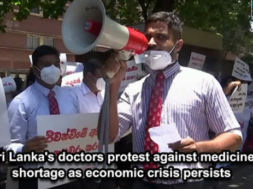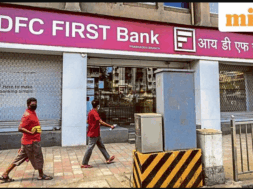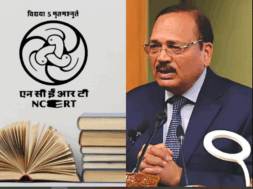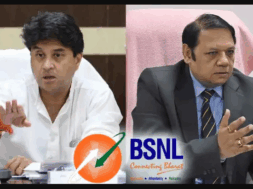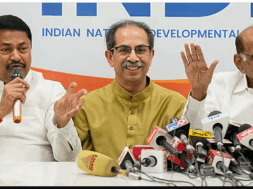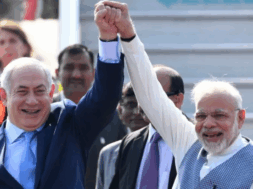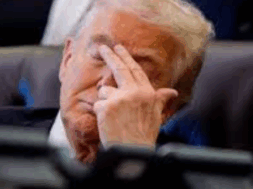
Roving Periscope: SL clamps 2nd emergency as Nepal, Pak economies falter
Virendra Pandit
New Delhi: South Asia seems to be in an unprecedented ferment after a broke Sri Lanka, facing its worst-ever economic crisis since March, re-imposed a nationwide emergency for a second time in five weeks on Friday while the economies of two more of India’s neighbors, Pakistan and Nepal, sank further.
As protests and strikes showed no signs of weakening, Sri Lankan President Gotabaya Rajapaksa announced a state of emergency on Friday night to contain public resentment against the vice-like grip of the Rajapaksa family on the island nation amid a deepening economic crisis.
While the people openly blame the Rajapaksas for plunging foreign exchange deficit, high external debt of over USD 50 billion, and rampaging inflation and prices, Prime Minister Mahinda Rajapaksa, in a statement, denied that his brother President Gotabaya had asked him to quit.
Battling an unprecedented economic meltdown since its Independence from the British in 1948, Sri Lanka had announced in April it was defaulting on its USD 51 billion foreign debt. Its Finance Minister Ali Sabry, who tried to secure a bailout package from the IMF, warned this week that the country will have to endure its unprecedented economic hardships for at least two more years.
The crisis is so deep-rooted that the Opposition, which is trying to dislodge the Rajapaksas from power and has also given a no-confidence notice, is itself reluctant to take charge, lest the surging tide drowned it as well. Nobody knows if a change in the government could really improve the situation.
India, which holds three percent of Sri Lankan debt, is worried that the island nation might slide into a civil war, and humanitarian crisis, and become a failed state. China’s debt trap could make Sri Lanka a Chinese colony with serious geopolitical and geostrategic ramifications. That is why New Delhi is trying to help Sri Lanka to the extent possible.
In the last three months, India has given USD 2.5 billion in support. Colombo has also returned to its principal supporter, China, asking for a debt roll-over as Beijing did in Pakistan, another country facing bankruptcy.
And like Pakistan, Sri Lanka is also negotiating with the IMF for financial aid to stem the present crisis. China holds 10 percent of Sri Lankan debt. Other lenders like Japan, World Bank, and the Asian Development Bank, hold a majority of foreign debt in Sri Lanka.
But Sri Lanka is not the only problem India faces on its sensitive borders. The economic situation of China-friendly Pakistan and Nepal is also in dire straits because of the mess created by poor governance, rising external debt, and food-fuel inflation. All these three countries, under severe economic stress, are part of China’s USD 200 billion Belt and Road Initiative (BRI) and are debt-trapped by its Exim Bank’s highly expensive commercial loans.
The ongoing economic crisis in the Indian neighborhood is a challenge to New Delhi as public anger in these countries could lead to a humanitarian crisis with refugees pouring from north Sri Lanka in Tamil Nadu and from Nepal through borders it shares with Bihar and other states.
Although Pakistan has secured a fresh commitment of loan from Saudi Arabia and the UAE recently, Islamabad suspects it is only lip service as little was done on the ground, according to the media reports.
The present economic crisis in Sri Lanka, Nepal, and Pakistan has built over decades of financial profligacies and poor governance.
While Nepal has banned the import of luxury items, and Pakistan tried to rationalize fuel and electricity subsidies, Sri Lanka may head for worse with the public totally against the Rajapaksa government and the Opposition not having enough strength to provide a political alternative.
The situation in their erstwhile benefactor, China, is no better either. With a fresh outbreak of Covid-19 infecting over 25 million people despite the strictest and most brutal lockdowns, Beijing itself is facing economic stagnation after a long time. Struggling to contain both the pandemic and economic slide, China may find it difficult to bail out the three South Asian nations.
Amid these crises, any change in governments would mean little as the next one might also face the same music. In Pakistan, the Shehbaz Sharif-led government replaced Imran Khan’s but found the treasury empty. In Sri Lanka, the PM has refused to step down despite escalating demonstrations across the island nation. The situation in Nepal is no different.
